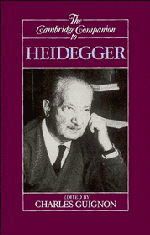Book contents
- Frontmatter
- Introduction
- 1 The question of being
- 2 Reading a life
- 3 The unity of Heidegger's thought
- 4 Intentionality and world
- 5 Time and phenomenology in Husserl and Heidegger
- 6 Heidegger and the hermeneutic turn
- 7 Death, time, history
- 8 Authenticity, moral values, and psychotherapy
- 9 Heidegger, Buddhism, and deep ecology
- 10 Heidegger and theology
- 11 Heidegger on the connection between nihilism, art, technology, and politics
- 12 Engaged agency and background in Heidegger
- 13 Wittgenstein, Heidegger, and the reification of language
- Bibliography
- Index
9 - Heidegger, Buddhism, and deep ecology
Published online by Cambridge University Press: 28 May 2006
- Frontmatter
- Introduction
- 1 The question of being
- 2 Reading a life
- 3 The unity of Heidegger's thought
- 4 Intentionality and world
- 5 Time and phenomenology in Husserl and Heidegger
- 6 Heidegger and the hermeneutic turn
- 7 Death, time, history
- 8 Authenticity, moral values, and psychotherapy
- 9 Heidegger, Buddhism, and deep ecology
- 10 Heidegger and theology
- 11 Heidegger on the connection between nihilism, art, technology, and politics
- 12 Engaged agency and background in Heidegger
- 13 Wittgenstein, Heidegger, and the reification of language
- Bibliography
- Index
Summary
Many commentators have remarked on the affinities between Heidegger's thought and East Asian traditions such as Vedanta, Mahayana Buddhism, and Taoism. In this essay, I shall examine critically some aspects of the apparent rapport between Heidegger's thought and Mahayana Buddhism. One reason for recent interest in Heidegger's thought and in Buddhism is that both are critical of and claim to offer an alternative to the anthropocentrism and dualism that some critics say is responsible for today's environmental crisis. According to such critics, Western humankind is particularly anthropocentric. Regarding humanity as the source of all meaning, purpose, and value, humans justify doing anything they want with the natural world. Western humanity also thinks in terms of dualisms and binary oppositions, such as mind versus body, reason versus feeling, man versus nature, male versus female.
- Type
- Chapter
- Information
- The Cambridge Companion to Heidegger , pp. 240 - 269Publisher: Cambridge University PressPrint publication year: 1993
- 24
- Cited by

